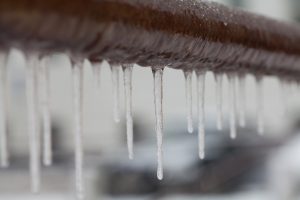 The great winter fear for plumbing: frozen pipes! It’s a trouble most of us have some familiarity with because of our extreme winters. It’s the reason people tell you to always have your central heater set for at least 55°F when you’re away from home. There may be nobody in the house, but your pipes need a bit of warmth or they might freeze solid and create all types of problems.
The great winter fear for plumbing: frozen pipes! It’s a trouble most of us have some familiarity with because of our extreme winters. It’s the reason people tell you to always have your central heater set for at least 55°F when you’re away from home. There may be nobody in the house, but your pipes need a bit of warmth or they might freeze solid and create all types of problems.
Basic Pipe Freeze Prevention
The best way to deal with frozen pipes, if you want to speak broadly, is to stop them from freezing in the first place. We already mentioned keeping the thermostat set to a minimum of 55°F, even when nobody is home. There are other preventive steps you can take:
- Disconnect outdoor hoses from hose bibs and shut off these outside faucets. These are key spots where cold can get into the rest of the plumbing.
- On extremely cold days, allow some water to drip from faucets that would otherwise not be used. This moves the water, helping to stop it from freezing.
- Insulate exposed pipes. The best tool for this is insulation sleeves you can purchase from hardware stores. You can also call our plumbers for help with this.
- Check on weatherization for the house in general to seal up cracks that can allow in drafts. Drafts in areas you may not often go into are areas where pipes will be exposed.
Dealing With Frozen Pipes
What do you do when you end up with frozen pipes anyway? You’ll face two choices. You can try to thaw out the pipe on your own or you can call a professional plumber to help.
You might immediately think, “Well, I can thaw the pipe myself. I’ll just go get a…” and then list off some heat-generating device in your home. However, we don’t recommend you try this (whatever item you picked), and that’s not just because we’re looking to get your business. Attempting a DIY pipe thaw can escalate problems for your plumbing and it can even be dangerous.
First off, many of the heat-generating appliances you might use can be harmful: never use a blowtorch, any kind of propane heater, or any other open-flame device to thaw pipes. Space heaters aren’t good either because water meeting electricity is never good news. If you’ve got a frozen pipe in the wall, don’t try to cut through to reach it.
Something else to keep in mind: the act of thawing a frozen pipe is often what leads to the pipe bursting. If the thawing is done incorrectly, it will cause the pressure inside the pipe to increase, and this is what causes the lateral bursting.
But if you call our professional plumbers, you can relax. We have a long history dealing with frozen pipes in Burlington, VT homes: we know all the special precautions to take to get the job done quickly and safely and without putting your pipes in jeopardy of bursting. You’ll save time, headaches, and money when you go straight to the professionals to resolve the situation with the minimum amount of trouble and no further problems.
Red Rock Mechanical, LLC serves Northwest Vermont and Northeast New York. Call us to solve any winter plumbing problems you have.







